1. Overview of Meaning
The kanji “万” (pronounced “man” in Japanese) means “ten thousand.” It is often used to represent a large number or quantity, symbolizing abundance or a vast amount.
2. Formation and Radical
Formation of the Kanji: The kanji “万” is a pictogram that originally depicted a large number of items. It is classified as a pictographic character, which means it visually represents its meaning.
Radical: The radical for “万” is also “万,” which is used in various other kanji to convey similar meanings related to large quantities.
3. Examples of Usage
Common Words and Phrases: “万” is often found in words like “万歳” (banzai, meaning “long live”) and “万全” (banzen, meaning “perfect” or “thorough”).
Example Sentences in Daily Conversation:
- 「彼は万ドルの価値がある。」 (He is worth ten thousand dollars.)
- 「万が一のために、準備をしておこう。」 (Just in case, let’s be prepared for anything.)
4. Synonyms and Antonyms
Similar Kanji: The kanji “千” (sen) means “thousand,” which is a smaller quantity compared to “万.” While both represent large numbers, “万” signifies a much greater amount.
Antonyms: The kanji “少” (shou) means “few” or “little,” representing a small quantity, which is the opposite of “万.”
5. Cultural and Historical Background
Relation to Japanese Culture: The concept of “万” is deeply embedded in Japanese culture, often associated with prosperity and good fortune. It is frequently used in celebrations and auspicious occasions.
Proverbs and Idioms: One common saying is “万事万端” (banshi bantan), which means “everything is in order” or “all matters are taken care of,” emphasizing thoroughness and completeness.
